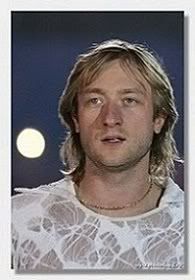At the European Figure Skating Championships in Sheffield (UK), 2006 Olympic champion, 2002 and 2010 Olympic silver medalist, three times world champion Evgeni Plushenko won his seventh gold medal at continental championships. He shared his impressions about Sheffield, and talked about future plans with TEAM RUSSIA-2014 special correspondent.
- What does it feel like to become a seven-time European champion?
- It's like going 10 years back. In fact, I began a new phase of my career. I am not one of those people who wins Olympic Games once and starts living off the dividends. Any athlete wants to do what he does best - to compete. For me now the biggest motivation is 2014 Olympics in Sochi. It will be my fourth Games. I do not know what the result will be, but the participation itself is a victory.
- Is it harder to struggle with competitors or with yourself?
- I long ago ceased to struggle with competitors, although it's true that the competition in figure skating is increasing every year. There are many strong athletes. I'm trying to overcome myself, sometimes forcing myself to skate. In training, the same jump sometimes is easy, and sometimes is intolerable pain. I'm not complaining. Everything is going fine.
- Is your injury the result of the complex jump combinations you used to train at the beginning of 2000s when you performed "4 +3 +3" combination?
- Rather, it is a result of the fact that I've skated for a very long time. Daily exercise, regular physical activity. Figure skating is not only a "4 +3 +3", which was performed - the first and only - by me at world and European championships.
- Didn't the Olympic champion Alexei Yagudin perform this combination?
- Not in competitions. At the 2002 Games in Salt Lake City and at one other competition he did "4 +3 +2". So far I'm the only one who did the most difficult jump combination. I trained also quadruple lutz and "triple axel - quadruple toe loop" combination and the combination of two quadruple toe loops. Doing such complex jumps is impossible without daily practices. Unfortunately, it is impossible to temporarily replace a leg or to lend another back for one day.
- Is your training process now the same as it was twelve years ago, when you were doing the most difficult jumps?
- It's different. Preparing for the season, I go through a full training cycle. Right before the event, the practices are very short, just technique. Although they aren't any less intense than 10 years ago.
- Has your lifestyle also changed over the past 10 years?
- At some point, it has changed, but now my whole life, as before, is concentrated on sport. This season, I declined all the offers to skate in shows. The exceptions were two performances in Italy, on December 31 and January 1. After the Russian championship it was even useful to perform for the audience the elements that I didn't do too well in Saransk. When we decided that I will skate at the European Championships, this kind of training was necessary.
- Do you receive many offers to skate in shows?
- This summer, there was an offer to skate in a tour of 50 shows in Japan only. I declined, as well as offers of shows in China and Korea, that were very financially advantageous. Instead, I chose to train. I didn't attend any social events either, only the ones held by our business partners. My life was a very strict routine: morning practice, rest, evening practice or rehabilitation procedures. There was a plan, and our team followed it.
- Who made the decision about your participation in the European Championship 2012? Perhaps there were other options?
- The Federation of figure skating in Russia (FFKR) had the final say. The opinion of my coach Alexei Mishin was also taken into account. The problem was, I didn't have ranking points necessary for participation in the European Championship in 2012. This delicate moment was resolved thanks to the efforts of FFKKR and goodwill of the International Skating Union (ISU) officials.
- How did you feel about skating in qualifications round here in Sheffield?
- There was a time when qualifying round was obligatory for all participants, regardless of rank and titles. Now for me it was just a chance to try skating at the European Championships and see if I was able to survive the competition in my current physical condition. At the same time, it was one more chance to practice skating in competition mode. A prelude to the main event.
- Didn't you feel the temptation to simplify your free program in the preliminaries, leaving off the quad?
- On the contrary, it was necessary to include quad. Back when qualification was part of competitions, I never excluded complex elements. I even tried including "4 +3 +3" and second quad. To test your readiness and polish the execution of complex elements never hurts. It is also an opportunity to test the arena you are going to skate at.
- How was the rehearsal in Sheffield?
- It was very hard training. Before skating in qualifying round, I got five injections - two in the back and three in the knee. Physically I was not ready to skate a long program, and at the end it was hard.
- In the short program, it was obvious that you were skating with a special courage.
- It was the goal. Without a quad, you need to try to demonstrate clean lines and good emotions. I skated with pleasure and with soul. Although I forgot how it felt to skate so early. Waking up at five in the morning to go to the practice was especially hard.
- At the Olympic Games in Turin in 2006, you said that after winning the gold medal you had to find new incentives and new motivation. One of them were experiments in choreography, another - trying new difficult jumps. Now you cannot do quadruple lutz or flip because of your injury, but your current program is very similar to the Olympic one.
- I cannot agree with this. Yes, it is tango. Only at the 2010 Olympics in Vancouver it was a dance of passion and love, and now it's about suffering and disappointment. It has nothing to do with the result of the Olympic season. It's just that I like tango, and the programs are kind of echo in this rhythm. I love expressive, tough, but melodic music. That is how I see my tango of this season.
- You stay faithful to the choreographer David Avdysh and arranger Edwin Marton. Is there is a desire to experiment with another team?
- I love my team and do not intend to leave it. It does not mean that I won't willing to try anything else. Before the beginning of this season I worked with Stephane Lambiel. I have ideas for the new programs that I will definitely realize. At the same time, Avdysh and Marton and other people who helps me now will remain in our team.
- How did you work with Lambiel, your former rival, whose goal at each competition was to beat Plushenko?
- Working with Stephane was a great pleasure. He is a true professional, he choreographed a very good program. It was really unlike anything I had ever done before. But, after seeing the result, I said to my coach and choreographer: "We will do tango." At the same time, many movements that we rehearsed with Lambiel were included in the free program.
- For a long time, your coach Alexei Mishin could dictate you what to skate. Now the final word belongs to you?
- Except for the very first years of our collaboration, decision of what to skate was taken together. I'm grateful to Alexei Nikolayevich for always taking into account my position and giving me freedom in choosing the music and choreography.
- You mentioned that after the European Championships you were going to have a surgery. Why did you choose Germany?
- All my surgeries were done in Germany, and by now, German doctors thoroughly know my body. I also trust several Russian doctors, who helped me to get ready to important competitions, particularly, to this European Championship. Unfortunately, in Russia we don't have such conditions for rehabilitation procedures as there are in Germany. Now much is being done in this direction. The Ministry of Sport, Tourism and Youth Policy really helps figure skaters and other athletes. And yet, I still prefer Germany. Although the previous operation, which was done there, was not too successful. I suffered all season.
- Then how can you trust again the same doctors?
- They advised to avoid surgery, but I insisted. The doctor tried to minimize the meniscus excision. Now much more serious intervention is required. The doctor even asked me whether three years guarantee will be enough. I replied that two will be enough.
- After the Olympics 2010 in Vancouver, you were not planning to do quads in the future.
- I did not plan to compete at all! Just, as it turned out, I cannot do without the adrenaline of competitions. Hopefully, this operation will be successful, and after one and a half months, I will resume training.
 in that forum
in that forum  )
)


 and of course in Sochi
and of course in Sochi 
 OOOH DIMI SO SWEET
OOOH DIMI SO SWEET








